Tardunni
Tar...dun...ni (Cuneiform: 𒋻...𒂅...𒉌, tar...dun...ni, or Tar…ni, …birini, …irpirin)[1] son of Ikki (also reads Ikkibshakhmat, or Ikkipshakhmat), was a king, prince, ruler, or high-ranking official of the Zagros mountains area, circa 2000 BC.[2] Although "Tardunni" is the way his name has been traditionally deciphered, he may have been called differently: it has been proposed that he was rather called Lisir Pirini, son of Ikkid Samad.[3]
| Tardunni | |
|---|---|
| Possible King, prince, ruler, or high-ranking official of Lullubi | |
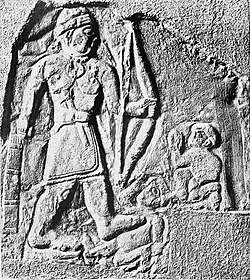 Relief of "Tar...dunni" | |
| Reign | Around 2000 BC or late 3rd millennium BC |
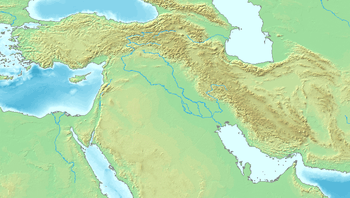
He is mainly known from a rock relief discovered in the valley of the Diyala river, in the Belula Pass, near the Lake of Darbandikhan, on the Horen Shekhan mountain (Kurdish: هۆرێن و شێخان; Arabic هورين- شيخان), in the extreme northeast of Iraq, near the border with Iran.[3]
Very little is known about Tardunni. He was probably a ruler of the Lullubi mountain tribe.[4] Some of their reliefs are known about 55 kilometers away, such as the Anubanini rock relief, which are very similar to the relief of Tardunni.[2][3] Another opinion suggests that he was a Gutian[5].
In his relief, he is seen wearing weapons and trampling enemies. On the side, the relief has an inscription in the Akkadian language, invoking the protection of the deities Shamash and Adad:[2]
"Tar...dunni, prefect (?), son of Sin (?)-Ipshah, all this image was replaced. As it was falling apart, he restored it. Anybody who destroys this image, his race, his name will be eradicated by Shamash and Adad!"
— Inscription of Tardunni.[6]
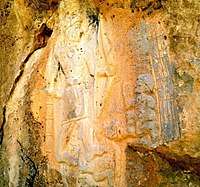 Rock-relief of Darband-i Belula at Horen Shekhan, Sulaymaniyah, Iraq
Rock-relief of Darband-i Belula at Horen Shekhan, Sulaymaniyah, Iraq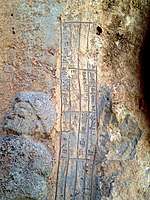 Akkadian script of the rock-relief of Darband-i Belula, Horen Shekhan, Sulaymaniyah, Iraqi Kurdistan
Akkadian script of the rock-relief of Darband-i Belula, Horen Shekhan, Sulaymaniyah, Iraqi Kurdistan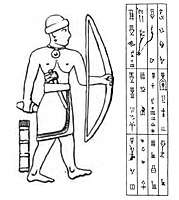 Drawing of Tardunni, and reproduction of the inscription.
Drawing of Tardunni, and reproduction of the inscription.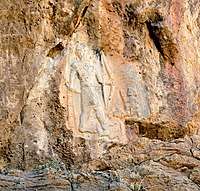 Rock-relief of "Tar...dunni" at Darband-i Belula, Horen Shekhan, Sulaymaniyah, Iraq
Rock-relief of "Tar...dunni" at Darband-i Belula, Horen Shekhan, Sulaymaniyah, Iraq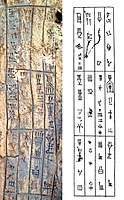 Inscription and transcription.
Inscription and transcription.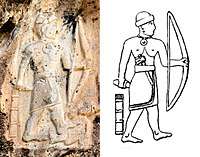 Portrait of Tardunni
Portrait of Tardunni.jpg) The name "Ta...dun...ni" and its proposed transcription in standard Sumero-Akkadian cuneiform
The name "Ta...dun...ni" and its proposed transcription in standard Sumero-Akkadian cuneiform
See Also
References
- Amin, Osama. "Never Before Seen: The Belula Pass Rock Relief". Ancient History Encyclopedia. Retrieved 23 March 2019.
- Cameron, George G. (1936). History of Early Iran (PDF). The University of Chicago Press. p. 41.
- The Cambridge History of Iran, Volume 2. Cambridge University Press. 1986. pp. 38–39. ISBN 9780521200912.
- Edwards, I. E. S.; Gadd, C. J.; Hammond, N. G. L. (1971). The Cambridge Ancient History. Cambridge University Press. p. 444. ISBN 978-0-521-07791-0.
- Amin, Osama. "Never Before Seen: The Belula Pass Rock Relief". Ancient History Encyclopedia. Retrieved 23 March 2019.
- Maspero, G. (Gaston) (1870). Recueil de travaux relatifs à la philologie et à l'archéologie égyptiennes et assyriennes. Paris : Libr. Honoré Champion. p. 105.